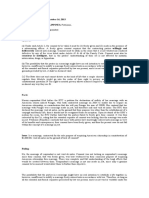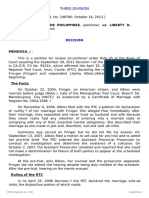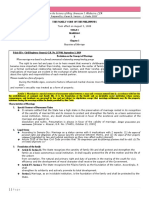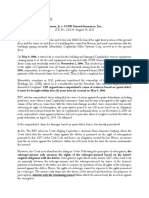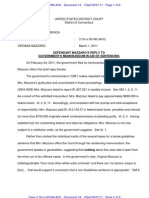Republicv vs. Albios
Republicv vs. Albios
Uploaded by
Kim CajucomCopyright:
Available Formats
Republicv vs. Albios
Republicv vs. Albios
Uploaded by
Kim CajucomOriginal Description:
Original Title
Copyright
Available Formats
Share this document
Did you find this document useful?
Is this content inappropriate?
Copyright:
Available Formats
Republicv vs. Albios
Republicv vs. Albios
Uploaded by
Kim CajucomCopyright:
Available Formats
Cajucom, Katrina Monica T.
Consent
098253 #2
REPUBLICV VS. ALBIOS
G.R. 198780. October 16, 2013.
FACTS:
On Oct. 22, 2004, Fringer, an American citizen, and respondent Albios were married before
the Metropolitan Trial Court of Mandaluyong City as evidenced by a Certificate of
Marriage
On Dec. 6, 2006, Albios filed with the RTC a petition for declaration of nullity of her
marriage with Fringer alleging that immediately after their marriage, they separated and
never lived as husband and wife and describe it as a “marriage in jest”
RTC declared the marriage void ab initio ruling that they married for convenience only
where Albios contracted Fringer to enter into marriage to acquire American citizenship
but that after the marriage, Fringer never processed her petition for citizenship nor did
she pay him the agreed $2, 000.00
OSG appealed to the CA which affirmed the RTC ruling such that the essential requisite
of consent to the marriage was lacking since the parties never intended to live as husband
and wife nor build a family
ISSUE: Whether a marriage, contracted for the sole purpose of acquiring American citizenship in
consideration of $2,000.00, void ab initio on the ground of lack of consent?
RULING: NO. Under Article 2 of the Family Code, for consent to be valid, it must be (1) freely
given and (2) made in the presence of a solemnizing officer. Consent must be real in the sense that
it is not vitiated nor rendered defective by any of the vices of consent under Articles 45 and 46 of
the Family Code, such as fraud, force, intimidation, and undue influence. Consent must also be
conscious or intelligent, in that the parties must be capable of intelligently understanding the nature
of, and both the beneficial or unfavorable consequences of their act.
Fringer and Albios’ consent to the marriage was not vitiated nor rendered defective by any vice of
consent. Their consent was conscious and intelligent, understanding the nature and benefit of the
marriage and freely given for the conscious purpose of acquiring American citizenship. There was
a full and complete understanding of the legal tie that would be created between them, since it was
that precise legal tie which was necessary to accomplish their goal. Genuine consent, was therefore
present.
Motives for entering into a marriage are varied and complex. The State does not and cannot dictate
on the kind of life that a couple chooses to lead. The right to marital privacy allows married couples
to structure their marriages in almost any way they see fit, to live together or live apart, to have
children or no children, to love one another or not, and so on. Thus, marriages entered into for
other purposes, limited or otherwise, such as convenience, companionship, money, status, and title,
provided that they comply with all the legal requisites, are equally valid.
You might also like
- Free Adobe Photoshop cs2 Keygen Paradox PDFDocument5 pagesFree Adobe Photoshop cs2 Keygen Paradox PDFAhmad MaulanaNo ratings yet
- CONSTI - Republic v. AlbiosDocument2 pagesCONSTI - Republic v. AlbiosCelestino LawNo ratings yet
- Bar Review Companion: Civil Law: Anvil Law Books Series, #1From EverandBar Review Companion: Civil Law: Anvil Law Books Series, #1No ratings yet
- Compromise Agreement Rommel Cawaing Eli Cardinez and Robert TriaDocument4 pagesCompromise Agreement Rommel Cawaing Eli Cardinez and Robert TriaJaime GonzalesNo ratings yet
- Republic v4Document4 pagesRepublic v4Bangsa Qu RashNo ratings yet
- Republic v. Albios DigestDocument2 pagesRepublic v. Albios Digestviva_3375% (4)
- Republic V AlbiosDocument2 pagesRepublic V Albiosanne6louise6panagaNo ratings yet
- Facts:: Republic V. Albios G.R. NO. 198780 October 16, 2013Document1 pageFacts:: Republic V. Albios G.R. NO. 198780 October 16, 2013Patrick Dag-um MacalolotNo ratings yet
- (05.H.02.g.01) Republic Vs AlbiosDocument1 page(05.H.02.g.01) Republic Vs Albioswintervanilla1214No ratings yet
- Republic v. AlbiosDocument2 pagesRepublic v. AlbiosJf ManejaNo ratings yet
- Case N4Document25 pagesCase N4yetyetNo ratings yet
- Republic V Abios DigestDocument3 pagesRepublic V Abios DigestJustin ParasNo ratings yet
- REPUBLIC vs. ALBIOS G.R. No. 198780 October 16, 2013Document2 pagesREPUBLIC vs. ALBIOS G.R. No. 198780 October 16, 2013rolan.mercadoNo ratings yet
- 05 (Tinio) - Republic vs. AlbiosDocument2 pages05 (Tinio) - Republic vs. AlbiosMitch TinioNo ratings yet
- Republic vs. Albios Nature of Marriage Petitioner Respondents Recit-Ready Summary/FactsDocument2 pagesRepublic vs. Albios Nature of Marriage Petitioner Respondents Recit-Ready Summary/FactsAljenneth MicallerNo ratings yet
- Case Digest 4Document26 pagesCase Digest 4Arrianne ObiasNo ratings yet
- Rep Vs AlbiosDocument7 pagesRep Vs AlbiosERNIL L BAWANo ratings yet
- Case Digest Republic V Albios PFRDocument3 pagesCase Digest Republic V Albios PFRDan Paule100% (3)
- Republic Vs Liberty Case DigestDocument3 pagesRepublic Vs Liberty Case DigestMonique OsinadaNo ratings yet
- Faller NotesDocument72 pagesFaller NotesAnneLumbreNo ratings yet
- Reviewer PFRDocument13 pagesReviewer PFRCh R LnNo ratings yet
- PDFDocument12 pagesPDFThe Supreme Court Public Information OfficeNo ratings yet
- Case Digest PFR (Groupings)Document4 pagesCase Digest PFR (Groupings)OCP Santiago City100% (1)
- Republic vs. AlbiosDocument2 pagesRepublic vs. AlbiosJam GonzagaNo ratings yet
- 10 16 2013 G. R. No. 198780 RP Vs ALBIOSDocument2 pages10 16 2013 G. R. No. 198780 RP Vs ALBIOSConan Grace AgasNo ratings yet
- REPUBLIC Vs ALBIOS (Digest)Document2 pagesREPUBLIC Vs ALBIOS (Digest)Laurena ReblandoNo ratings yet
- Republic v. AlbiosDocument2 pagesRepublic v. AlbiosSophia Patrice VelascoNo ratings yet
- Republic V AlbiosDocument2 pagesRepublic V Albiostherouguedragonrider14No ratings yet
- Republic of The Philippines vs. Liberty D. Albios - G.R. No. 198780 - October 16, 2013Document2 pagesRepublic of The Philippines vs. Liberty D. Albios - G.R. No. 198780 - October 16, 2013Kaye MendozaNo ratings yet
- Republic of The Philippines, Petitioner, vs. Liberty D. AlbiosDocument12 pagesRepublic of The Philippines, Petitioner, vs. Liberty D. AlbiosAM CruzNo ratings yet
- G.R. No. 198780 October 16, 2013 Republic of The Philippines, Petitioner, LIBERTY D. ALBIOS, RespondentDocument6 pagesG.R. No. 198780 October 16, 2013 Republic of The Philippines, Petitioner, LIBERTY D. ALBIOS, RespondentJoem MendozaNo ratings yet
- Facts:: Republic vs. Albios, G. R. No. 198780, October 16, 2013Document1 pageFacts:: Republic vs. Albios, G. R. No. 198780, October 16, 2013rhod leysonNo ratings yet
- Republic v. Albios, G.R. No. 198780, October 16, 2013Document9 pagesRepublic v. Albios, G.R. No. 198780, October 16, 2013Jennilyn Gulfan YaseNo ratings yet
- Family Cases 1-33Document197 pagesFamily Cases 1-33Kent Francesco JongoyNo ratings yet
- Republic vs. Liberty Albios GR No. 198780 October 2013 - ADDITIONALDocument4 pagesRepublic vs. Liberty Albios GR No. 198780 October 2013 - ADDITIONALFrancise Mae Montilla MordenoNo ratings yet
- Marriage Rep. of The PH v. Albios (Oct 16 2013 Mendoza, J.) : Not "Entered Into For The Purpose of Evading ."Document8 pagesMarriage Rep. of The PH v. Albios (Oct 16 2013 Mendoza, J.) : Not "Entered Into For The Purpose of Evading ."Justine M.No ratings yet
- G.R. No. 198780 October 16, 2013 Republic of The Philippines, Petitioner, LIBERTY D. ALBIOS, RespondentDocument55 pagesG.R. No. 198780 October 16, 2013 Republic of The Philippines, Petitioner, LIBERTY D. ALBIOS, RespondentErwin BernardinoNo ratings yet
- G.R. No. 198780 October 16, 2013 Republic of The PHILIPPINES, Petitioner, LIBERTY D. ALBIOS, RespondentDocument15 pagesG.R. No. 198780 October 16, 2013 Republic of The PHILIPPINES, Petitioner, LIBERTY D. ALBIOS, RespondentKristelle IgnacioNo ratings yet
- Requisites of MarriageDocument13 pagesRequisites of MarriageDynli CharmNo ratings yet
- Digests PersonsDocument32 pagesDigests PersonsMariel Angela RoyalesNo ratings yet
- Republic Vs AlbiosDocument5 pagesRepublic Vs AlbiosKIRSTEL GYFVENETH POBLACIONo ratings yet
- PFR DigestsDocument83 pagesPFR DigestsAnne Vallarit100% (1)
- G.R. No. 198780 October 16, 2013 Republic of The Philippines, Petitioner, LIBERTY D. ALBIOS, RespondentDocument16 pagesG.R. No. 198780 October 16, 2013 Republic of The Philippines, Petitioner, LIBERTY D. ALBIOS, RespondentJerome A. CabanayanNo ratings yet
- Republic Vs AlbiosDocument7 pagesRepublic Vs AlbiosMar JoeNo ratings yet
- Case#2 Article 38: (Type Here)Document34 pagesCase#2 Article 38: (Type Here)Tsungkodong TweetysumNo ratings yet
- Republic Vs Albios DigestDocument1 pageRepublic Vs Albios Digestgem_mataNo ratings yet
- Republic v. AlbiosDocument9 pagesRepublic v. Albiosgregandaman079No ratings yet
- Republic Vs Albios PDFDocument2 pagesRepublic Vs Albios PDFJERROM ABAINZA100% (1)
- G.R. No. 198780 October 16, 2013 Republic OF THE PHILIPPINES, Petitioner, LIBERTY D. ALBIOS, RespondentDocument111 pagesG.R. No. 198780 October 16, 2013 Republic OF THE PHILIPPINES, Petitioner, LIBERTY D. ALBIOS, RespondentSpidermanNo ratings yet
- Republic v. Albios (G.R. No. 198780 October 16, 2013)Document7 pagesRepublic v. Albios (G.R. No. 198780 October 16, 2013)Hershey Delos SantosNo ratings yet
- Rosete Vs Sheriff of ZambalesDocument27 pagesRosete Vs Sheriff of ZambalesClaudine Christine A. VicenteNo ratings yet
- Case Digests - Void Voidable Marriages Legal SeparationDocument5 pagesCase Digests - Void Voidable Marriages Legal Separationsocanyou11No ratings yet
- G.R. No. 198780 - Republic v. AlbiosDocument7 pagesG.R. No. 198780 - Republic v. AlbiosNiel Robert UyNo ratings yet
- Republic V AlbiosDocument8 pagesRepublic V Albiosmel bNo ratings yet
- The Family Code of The Philippines PDFDocument91 pagesThe Family Code of The Philippines PDFEnrryson Sebastian0% (1)
- Republic V AlbiosDocument2 pagesRepublic V AlbiosLemUyNo ratings yet
- Case Digests On Civil Review 1 (Marriage, Foreign Marriages and Foreign Divorces) - John Phillip C. CorpuzDocument15 pagesCase Digests On Civil Review 1 (Marriage, Foreign Marriages and Foreign Divorces) - John Phillip C. CorpuzJohn CorpuzNo ratings yet
- 71 Republic Vs AlbiosDocument3 pages71 Republic Vs AlbiosClevum IamNo ratings yet
- The Family Code of The Philippines PDFDocument102 pagesThe Family Code of The Philippines PDFEnrryson SebastianNo ratings yet
- Digest Rush Persons 1Document3 pagesDigest Rush Persons 1Jimcris Posadas HermosadoNo ratings yet
- Morigo v. People: G.R. No. 145226, 6 February 2004 FactsDocument3 pagesMorigo v. People: G.R. No. 145226, 6 February 2004 FactsMaan LucsNo ratings yet
- Tribal Laws, Treaties, and Government: A Lakota PerspectiveFrom EverandTribal Laws, Treaties, and Government: A Lakota PerspectiveRating: 1 out of 5 stars1/5 (1)
- 212179-2018-Financing Company Act of 199820210904-12-Jeepl7Document24 pages212179-2018-Financing Company Act of 199820210904-12-Jeepl7Kim CajucomNo ratings yet
- 02 Luzon Iron Development Group CorpDocument3 pages02 Luzon Iron Development Group CorpKim Cajucom100% (1)
- 2012OpinionNo12 19Document5 pages2012OpinionNo12 19Kim CajucomNo ratings yet
- 16 BPI V LaingoDocument2 pages16 BPI V LaingoKim CajucomNo ratings yet
- 2020 UP BOC Commercial LawDocument456 pages2020 UP BOC Commercial LawKim Cajucom100% (1)
- 1 SmithKline Corp. Vs Eli Lilly and CompanyDocument3 pages1 SmithKline Corp. Vs Eli Lilly and CompanyKim CajucomNo ratings yet
- 03 MCIAA V City of Lapu-LapuDocument2 pages03 MCIAA V City of Lapu-LapuKim CajucomNo ratings yet
- 01 Henson JR V UCPB General InsuranceDocument2 pages01 Henson JR V UCPB General InsuranceKim Cajucom67% (3)
- Kalaw v. FernandezDocument2 pagesKalaw v. FernandezKim CajucomNo ratings yet
- 03 Knights of Rizal V DMCI Homes IncDocument5 pages03 Knights of Rizal V DMCI Homes IncKim CajucomNo ratings yet
- 01 Metrobank V Junnel's Marketing CorporationDocument4 pages01 Metrobank V Junnel's Marketing CorporationAnonymous bOncqbp8yiNo ratings yet
- 2010 Topic: PartitionDocument3 pages2010 Topic: PartitionKim CajucomNo ratings yet
- 100 Philippine Ports Authority V Nasipit Integrated ArrastreDocument1 page100 Philippine Ports Authority V Nasipit Integrated ArrastreKim CajucomNo ratings yet
- 282 Achilles Manufacturing Corp V NLRCDocument1 page282 Achilles Manufacturing Corp V NLRCKim CajucomNo ratings yet
- 208 Velasco V BelmonteDocument3 pages208 Velasco V BelmonteKim CajucomNo ratings yet
- 89 Western Guarantee V CADocument1 page89 Western Guarantee V CAKim CajucomNo ratings yet
- Cosca vs. Hon. Palaypayon, JRDocument1 pageCosca vs. Hon. Palaypayon, JRKim CajucomNo ratings yet
- 294 Lopez V National Steel CorpDocument1 page294 Lopez V National Steel CorpKim CajucomNo ratings yet
- 07 Filinvest Vs AdiaDocument2 pages07 Filinvest Vs AdiaKim CajucomNo ratings yet
- Pioneer Insurance and Surety Corp vs. Yap: 61 Warranties Effect of BreachDocument1 pagePioneer Insurance and Surety Corp vs. Yap: 61 Warranties Effect of BreachKim CajucomNo ratings yet
- 264 Wellington Investment vs. TrajanoDocument1 page264 Wellington Investment vs. TrajanoKim CajucomNo ratings yet
- 198 Autobus Transport Systems V BautistaDocument1 page198 Autobus Transport Systems V BautistaKim CajucomNo ratings yet
- 288 Marcos V NLRCDocument2 pages288 Marcos V NLRCKim CajucomNo ratings yet
- 222 PAL vs. NLRCDocument1 page222 PAL vs. NLRCKim CajucomNo ratings yet
- 258 Insular Bank of Asia and America Employees Union V InciongDocument1 page258 Insular Bank of Asia and America Employees Union V InciongKim Cajucom100% (1)
- 210 Rada V NLRCDocument2 pages210 Rada V NLRCKim CajucomNo ratings yet
- Catia Sheet Metal Design PDFDocument309 pagesCatia Sheet Metal Design PDFsimsonNo ratings yet
- Screenshot 2022-08-03 at 12.03.23 PMDocument12 pagesScreenshot 2022-08-03 at 12.03.23 PMAbhishekSaxenaNo ratings yet
- POLCOV Week 2Document3 pagesPOLCOV Week 2Lyka FrancessNo ratings yet
- Zen - The Wayless WayDocument140 pagesZen - The Wayless WayAbigail Doromal Albino90% (10)
- Gas Gangrene: Kimberlee Hobizal DPM, Mha FacfasDocument36 pagesGas Gangrene: Kimberlee Hobizal DPM, Mha FacfaswhidiNo ratings yet
- LESSON 3 Patterns of Text Development (Shortened)Document40 pagesLESSON 3 Patterns of Text Development (Shortened)Elijah OrdoñezNo ratings yet
- Nights in White Satin ChordsDocument3 pagesNights in White Satin Chordsfralab3132No ratings yet
- Mammography CMEDocument1 pageMammography CMEKirstie Marie SaldoNo ratings yet
- Numeracy in PracticeDocument93 pagesNumeracy in PracticePutri Intan PermatasariNo ratings yet
- MAZZARO Virginia Sentencing Memo ResponseDocument9 pagesMAZZARO Virginia Sentencing Memo ResponseEditor, Hartford CourantNo ratings yet
- Save You by Matthew Perryman JonesDocument2 pagesSave You by Matthew Perryman JonesIñigo Escalante100% (1)
- History PDFDocument4 pagesHistory PDFAbdulgafar OpeyemiNo ratings yet
- Genetics IntroDocument30 pagesGenetics IntroVin BaniquedNo ratings yet
- Behind The Scenes (USA 1994, Asia Carrera, BarbarDocument1 pageBehind The Scenes (USA 1994, Asia Carrera, BarbarvierjsNo ratings yet
- G.R. No. 237982 QT YolandaDocument15 pagesG.R. No. 237982 QT YolandaAzul Lai Ha100% (1)
- Framework Example - 7S CaseStudy For Organizational DevelopmentDocument12 pagesFramework Example - 7S CaseStudy For Organizational DevelopmentBobbyNicholsNo ratings yet
- People vs. Chua, 615 SCRA 132, G.R. No. 184058 March 10, 2010Document14 pagesPeople vs. Chua, 615 SCRA 132, G.R. No. 184058 March 10, 2010Jm SantosNo ratings yet
- March 2010 Grants Pass Gospel Rescue Mission NewsletterDocument6 pagesMarch 2010 Grants Pass Gospel Rescue Mission NewsletterGrants Pass Gospel Rescue MissionNo ratings yet
- Simple Present Tense - ReviewDocument4 pagesSimple Present Tense - ReviewThais HelenaNo ratings yet
- PHD Thesis Daniel MontofreDocument172 pagesPHD Thesis Daniel MontofreBryan GuevaraNo ratings yet
- GST MCQS - 2 Without AnswerDocument9 pagesGST MCQS - 2 Without AnswerSpidy MacNo ratings yet
- CHAPTER 15 ProbabilityDocument17 pagesCHAPTER 15 ProbabilityTeam RtobNo ratings yet
- Region 11 - REPORTDocument3 pagesRegion 11 - REPORTecca998No ratings yet
- BSM 50 GB 120 DLCDocument9 pagesBSM 50 GB 120 DLCNayer Alfredo Marrugo GutierrezNo ratings yet
- Cancel CultureDocument5 pagesCancel CultureMargot ZapolskaNo ratings yet
- CL01 Defining Classifying Project Management MethodologiesDocument9 pagesCL01 Defining Classifying Project Management MethodologiesCesar BasualdoNo ratings yet
- Arts7 q2 Mod1 Arts and Crafts of MIMAROPA and Visayas RegionsDocument29 pagesArts7 q2 Mod1 Arts and Crafts of MIMAROPA and Visayas RegionsZargham KhanNo ratings yet
- Was The Treaty of Versailles FairDocument3 pagesWas The Treaty of Versailles FairJaeWon100% (2)























